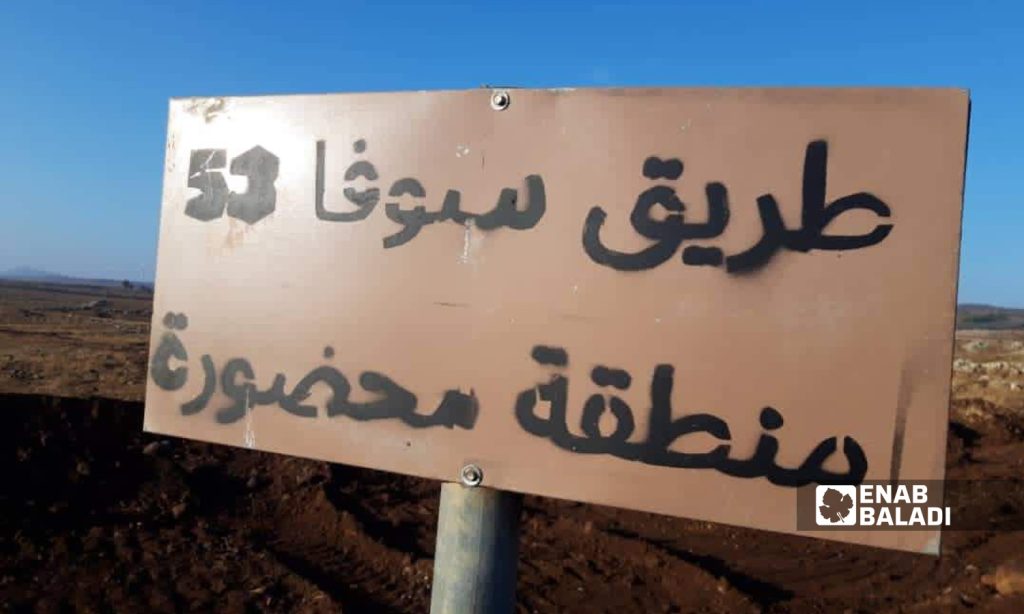Enab Baladi’s correspondent in southern Quneitra governorate reported that Israeli military vehicles are working on constructing and paving a road inside the Syrian territories.
Since mid-2022, Israeli forces have entered Syrian territory, with a military force consisting of six Merkava tanks and two military bulldozers, accompanied by a number of soldiers to monitor to construct the road.
The correspondent reported that the Israeli vehicles are continuing their work in paving the road to this day, and the depth of work within the Syrian territories has reached a minimum of about 100 meters, while in other areas, it has reached a depth of one kilometer.
According to the reporter, the Israeli army has named the road as “Sufa 53.”
The camera of Israeli correspondents monitored the operation of these military vehicles inside Syrian territory during different periods of time, the most recent of which was in November 2022, when the Israeli channel “Kan 11” published a report that included video recordings from inside Syrian territory.
There is no official Syrian comment yet on this Israeli expansion.
Israeli military bulldozers are advancing inside the Syrian lands to build the road, as they bulldozed some agricultural lands for the people of the border villages, such as the towns of Jubata al-Khashab and al-Hurriya in the northern countryside of Quneitra.
The Israeli army units worked to prevent the farmers from approaching the area during the operation of the machineries, as they opened fire on a daily basis to drive the farmers and shepherds away from the area.
A former commander at the Fursan al-Jolan faction, which was receiving Israeli support in southern Syria, told Enab Baladi that Israel has always tried to protect the border strip and monitor the area adjacent to its border with Syria.
The spread of Iranian militias, including the Lebanese Hezbollah, increased the need for Israel to monitor the area by establishing a security line inside the Syrian territory, starting from the foot of Mount Hermon, west of the town of Ain al-Tinah, in the far north of Quneitra, passing through the vicinity of the town of Jubata al-Khashab, all the way to the far south of Quneitra, according to the former commander.
The security movement coincided with frequent and almost daily targeting of any movement near the Israeli-Syrian border.
The Israeli army has previously destroyed several military points of the Syrian regime forces, due to the entry of Hezbollah militants and other pro-Iranian paramilitary groups into the region, according to the commander who is based in the area.
The state of the security alert on the borders coincides with periodic Israeli maneuvers inside the occupied Golan Heights, in which artillery, aircraft, and heavy machine guns are used, as their sounds are clearly heard inside the border villages and towns in Syria.
On 1 June 2022, units of the Israeli army penetrated Syrian territory to a depth of about 400 meters west of the town of al-Hurriya in the occupied Golan Heights and bulldozed forest trees in the town’s forest.
While the reasons for the entry of the Israeli forces were not known at the time, they made an incursion again in early November 2022 and began constructing a road from the Syrian side along the border.
A new road that the Israeli forces are working on paving inside the Syrian territory along the border of Israeli-Occupied Golan Heights – 9 November 2022 (Enab Baladi)
Syrian factions secure border
Many members and commanders of the opposition factions refused to hand over their weapons following the Russian-brokered security settlement in mid-2018 that enabled the Syrian regime to take full control of the southern region.
Some of these factions used to receive support from Israel in the northern and southern countryside of Quneitra and the villages of Mount Hermon, such as Beit Jinn, during the years of the opposition’s control of the area, including the Fursan al-Jolan and al-Harmoon Gathering, along with a group of small factions.
The settlement agreement was not fully applied to these groups, as its fighters kept their weapons, and they were able to stay in the buffer zone near the Syrian-Israeli border at the request of Israel to secure security protection for the border against militias loyal to Iran.
Israel has also facilitated the entry of some faction commanders, of Quneitra and its countryside, to the Occupied Golan Heights, where some of whom settled there, and some continued their way towards other countries.












